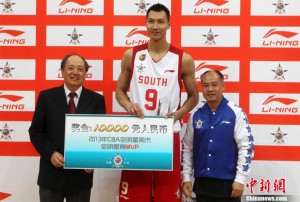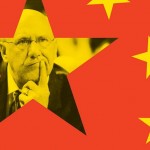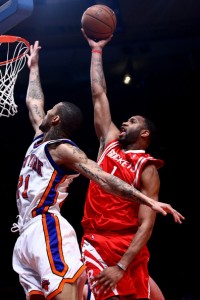The opening of the Chinese Basketball Association All-Star game saw Yi Jianlian fed the ball deep in the left block on the South squad’s opening possession. He operated crisply: baseline shake, one-bounce and a drop-step to the middle, and a sweet little leaner off the board. He was a man with a plan – one that included courtesy to his North opponents when they went inside, by the way – as the Guangdong Southern Tigers star notched 34 points and 8 boards on his way to a South division victory, 120-117, and MVP honours for himself. All this, of course, in front of his hometown fans in Guangzhou, where the prodigal son had come home.
Reviewed: Brave Dragons: A Chinese Basketball Team, an American Coach, and Two Cultures Clashing by Jim Yardley (Alfred A. Knopf, 2012, 304 pages)
[A slightly different version of this review also appears at www.Niubball.com, the best English-language look at all things basketball in China. It was published Feb. 22, just after T-Mac’s apparent farewell to China. Grown men cried in the airport as he left.]
I still remember that raised eyebrow, when I said, “It’s not really about basketball!” I was trying to convince my mother-in-law – potter, BBC-watcher, library ghost, someone for whom the Canadian Broadcasting Corp’s Radio 2 has gotten too damned poppy – to watch the superb documentary Hoop Dreams, a window into poverty, race, sport and education in America. This was a few years ago, and I was a new-enough son-in-law that she was still willing to give me the grudging benefit of her considerable doubt. She did finally watch it, and the review was fairly brief: “My dear, that most certainly was about basketball! But there were some interesting parts.”
So let me be clear. Brave Dragons by the American journalist Jim Yardley,
really is about the Shanxi (Taiyuan) Brave Dragons, their unpredictable owner (Boss) Wang Xingjiang, their 2008-09 season in the Chinese Basketball Association, and about Bob Weiss, the first former NBA bench boss to work in China, and the very mixed bag of players he had to work with. (I remember the chronically slump-shouldered Weiss, with a pained expression on his face, imploring referees or his Seattle Supersonics players to listen. Were I older, I’d remember him as a resilient, nothing-keeps-me-out-of-the-game player for the Chicago Bulls. Both of these qualities made him the perfect person to try to
coach in Taiyuan under Boss Wang.) It spotlights the babes-in-the-Chinese-woods that wide-eyed young Americans, imported for their superior skill, are in adjusting to hoops with Chinese characteristics. If you like basketball and find the idea (or the reality) of living in China fascinating, you’ll love Brave Dragons, but neither condition is necessary.
The I Love Tracy Show just came into my Saturday morning life, not-quite-live from Qingdao, China (that’s a city in Shandong province, just north of Shanghai). With an NBA game coming on at a routine-for-China 10:30 a.m., there was time for CCTV 5, my inscrutable Asian ESPN, to show a mercifully edited version of last night’s CBA game. The Qingdao Double Star Eagles were trying to keep their perfect record with the great T-Mac on board, and they did it! After losing to the Shandong Flaming Bulls — though apparently no animals were harmed in the naming of this team — they are now 0-9, and it wasn’t even that close a match. “Led” by the lethargic former NBA star – still an icon in China, having played much of his fluid prime in Houston alongside Yao Ming – the Eagles don’t guard much. Down 18 with under 5 minutes to play, they were in a flaccid zone, having been unable to contain a quick little American point guard named Pooh Jeter, and Jordanian forward Zaid Abbas (who pretty much had his way with Mr. McGrady). It was another day in the life of Americans trying to find a basketball refuge (and make a few million yuan, in this case) in the Middling Kingdom of pro basketball.
To paraphrase the late great media blowhard Howard Cosell – and listen, though he blew hard, he often blew well, but who calls anybody a “blowwell”? – I reject the notion that the NBA is a sacred cow which emits only the purest of good, wholesome milk. (Even when The Finals begin in Oklahoma.) I’m a basketball lover, a long-time coach, someone who still pumpfakes and dropsteps and stumbles around outdoor courts with college students. In China. (And no, I don’t often post guys up. 5’10 ¾” is bigger here than back home in Ontario, but I’m not usually the big man on campus courts and I don’t jump anymore.) I’ve loved (and often hated) the Association since well before Miami or Oklahoma City dreamed of having teams, when Dave Cowens was a floorburned 6’9” centre and Bob McAdoo, an early Kevin Durant prototype, floated jumpers for the Buffalo Braves. (Yeah, I bin around.)
Now, for three years, I’ve watched my NBA games in the mornings when I’m free.
I am posting, today, a long and windy account of watching the first game of the 2012 NBA Finals from my apartment in China. It’s in the It’s All About Sports! section, and to be sure, it’s pretty sporty. If you’re not a basketball fan, though, you might be interested in the reflections on life in China that it incidentally and breezily offers. Very browsable.
I had just finished watching the game when I received Karl’s message. The United States, led not by one-name celebrities like Kobe and LeBron but by the gifted young star, Kevin Durant, defeat Turkey to win the quadrennial FIBA championship. Order has been restored (again), and the Americans re-asserted their claim to the summit of the world’s basketball heap. This was not the “Redeem Team”, the collection of NBA royalty that brought the Olympic Gold back to the United States from Beijing after the humiliation of a bronze medal in 2004. (After a long tradition of Olympic gold, the Americans silvered in a controversial final-game loss to the Soviets in 1972, and bronzed in 1988, the last time they sent a group of college kids into the five rings. The famous “Dream Team” of 1992 – Larry, Magic, Michael, et al. – was supposed to signal the return of never-ending American mastery as the United States could thenceforth send its top professionals.)
Here we are, in jockdom’s Most Wonderful Time of the Year — NBA and NHL playoffs, college basketball just finished, baseball beginning, Master’s golf if you consider golf a sport, the NFL draft if you’re in serious need of therapy — and I’m worried. I do hop on cbssports.com a couple of times a week to see who’s beating whom in hoops. I live in Ottawa, so the briefest dalliance with local JockRadio tells me more about the NHL smash-mouth Olympics than, strictly speaking, I actually need to know. I guess I’m saying that my personal sports mania may need a shot of sildenafil citrate.
(And I’m not really “worried”. I’m not a complete Peter Pan, and while I’ve often said that my own immaturity was an advantage in relating to kids, I’m not completely opposed to putting away childish things. But it’s interesting. Year after year, I find that I’m content with knowing just a little bit less about pro sports. Watchin’ every last game? No need. I’ve seen so many that it’s much more efficient, if I really feel the need, to read a game summary and say Hmm. The Spurs went out in five to the Mavericks. I like the Spurs. So I read to find out why they lost. No Ginobili. Big numbers for Parker and the Big Fundamental, but not enough. So there you go.)
And a Prairie Woman Shall Lead Them…?
First things first: this is not like baseball star Larry Walker being National League MVP and getting “beat by a car” for the Lou Marsh trophy as Canada’s outstanding athlete (that car, a very fast one that season, was driven by Jacques Villeneuve in Formula 1). Today the TorinoFabulous Cindy Klassen was given the award, and I applaud her heartily. For reasons that the Globe’s Stephen Brunt outlined on Saturday, it was a brilliant year for sweaty Canucks but, like him, I hold out for Steve Nash. (I wrote about him, with appropriate playground bedazzlement, here.)
The Lou Marsh voters, sportwriters all, tend to prefer international athletes, those not getting the usual Canadian buzz for whichever homeboy leads the NHL scoring parade. (Wayne Gretzky and Mario Lemieux combined for 16 Art Ross trophies as scoring champs and 12 NHL MVPs, but “only” five Lou Marsh awards. They were beaten, for example, by Olympians like Gaetan Boucher, Susan Nattrass (target shooting!), Carolyn Waldo (synchro swimming!!), Myriam Bedard (betcha can’t name her sport) and Silken Laumann. Oh, and by a guy called Ben Johnson. Twice. Oops.) Villeneuve was a bit of a departure from this tradition of honouring competitors in sports with a lower profile (and lower salaries), and I won’t start ranting about the dubious athleticism of car jockeys. The choice of Klassen, though, who will continue to be the focus of high-pressure expectation and excitement as the Games come to Vancouver in 2010, is one that honours a great athlete and addresses, in small measure, the usual disregard for female sport. Bravo, say I.
I can’t get much righteous indignation going, though, at the selection of a marvellous Olympian like Klassen. She was a powerhouse at the Torino Winter Games, the most outstanding athlete there and the leader of a superb crew of Canadian women athletes with her five medals, including an individual gold and two silvers. She’s the most decorated Canadian Olympian ever, the 2006 speedskating World Cup champion., and bubbled radiantly with grace and joy at her accomplishments and, wonderfully, at those of her teammates. (I wrote about her with great enthusiasm here last February.)
But I can’t help but say this: how many basketball players are there in the world? Of all those many millions, how many times will a Canadian be judged, for the second straight year, the most valuable to his team at the highest level? Fine. And how many competitive female speedskaters are there on the planet at any given time? Would there be more than ten thousand? I feel like a jerk for pointing out numbers like that, because Cindy Klassen represents much that is most honourable in sport, including the chance for young women to see a wonderfully strong role model and young men to (briefly?) cheer a strong, accomplished and fully-clothed woman. The Olympics are one of the few occasions when female athletes can take centre stage, albeit too often for events with sequins and swimsuits. So it is a sweet thing for this attention to a superb competitor to continue. But the greatest accomplishment by a Canadian athlete, in this or nearly any other year, is that of Mr. Nash.
(This article was written in January 2003, just after the Canadian Junior Hockey Team had lost the gold medal in the World Championships of that year. They lost to the Russians, which is no shame, but...)
Silver is silver, and we can still bask nationally in the sun of Salt Lake, but there was something in that oh-so-close loss to the Russian juniors that was irritating. Our man Fleury was superb in goal and probably won his M.V.P. award on the strength of that last game, and the Canadian boys were plucky but overmatched. It really wasn’t that close. The thing that got to me, though, was the tearful commentary of one of the lads, trying to figure out what had happened to him, his mates, his nation. “We gave everything we had, we played with lots of heart…” Ugh. Heart. When will we realize that’s not enough?
Of course they played with heart. That’s a given, isn’t it? Yes, and our Canadian men fought with brilliant heart at Dieppe, too, but we remember equally the criminal lack of preparation with which they launched themselves against a mighty foe. Please don’t mistake me, I don’t equate the two enterprises; I just wonder, with the 30th anniversary of the Summit Series having just passed, when Canadian hockey men will finally admit that we can learn about Our Game from people who don’t come from Kingston, Ontario? Captain Scottie Upshall did (“that’s a great team over there, they must be doing some things right in Russia”), and it’s astonishing, from where I sit, that we still teach our young players that heart is pre-eminent.
The situation in other sports is instructive. Holger Osieck, a German, was brought in to coach our national men’s soccer side. He deplored the Canadian style of play, which involved a lot of long hopeful kicks and furious running—can you say “dump and chase”?—and immediately required ball-control strategies. Not only that, he had asked for and been granted the authority to dictate his methods to the feeder elements of the national program; there is a unity of purpose here that is strikingly absent in Canadian hockey.
Last summer’s World Championships of basketball provide an example that Canadian hockey-lovers should recognize. The Americans entered their “Dream Team” in Barcelona in 1992, their college all-star teams having lost in ’72 (“we wuz robbed!”) and ’88 (“oh-oh, they’re catchin’ up!”). The youngsters were vulnerable, but when they sent Michael, Larry, and Magic, it was no contest. Until, ten years later, it was. The national hand-wringing after NBA players fell so clumsily last summer was eerily familiar to Canadians. ESPN commentator Jay Bilas, a former Duke University star, was most eloquent. Even when the Americans still had their chance to win (after losing to Argentina in pool play), Bilas was sounding the alarm. We can’t just throw all-star teams together. We need to prepare. Our kids aren’t learning skills. They play too much and practise too little. The Europeans have better fundamentals…Sound familiar? Their first wake-up call came in 1972, when the Soviets won Olympic gold in Munich, but their true dominance of basketball remained unquestioned. Last summer, for American hoops, was a closer analogy to the periodic bouts of Canadian dismay that began in ’72. Our experience in self-examination allows this prediction. American basketball chauvinists will prevail. They’ll learn some small technical lessons from Indianapolis, but dismiss it as an aberration. Shrill voices will occasionally demand a fundamental rethinking of the way “our game” is approached. They will be ignored. And the rest of the world will continue to improve…
The Americans could learn a lot from our experience as the erstwhile “first nation” of hockey (or England’s in soccer, for that matter, which finally, desperately, hired Sven Goran Eriksson as its first foreign national coach; imagine that happening in USA Basketball, or Hockey Canada!). But they won’t. We haven’t learned. Our pride in the Canadian Way to Play is quaint, but it is increasingly relegating our top athletes to “role player” status, while the NHL imports its dazzle. What’s worse is that we’ve accepted this so completely, even romanticizing it as the demonstration of genuine passion, true “heart”, and the virtues of “old-time hockey”. Amazingly, even the careers of Wayne Gretzky and Mario Lemieux have not removed a rather defensive attitude of suspicion toward players, Canadian or otherwise, who are distinguished by their skill and cleverness. Gretzky seems poised to act as the national face of hockey, and his insistence on a game of puck movement and speed for our Olympic teams bears great promise. Are Canadian youngsters, and especially coaches, more likely to hear that quadrennial voice, or Coach’s Corner on Saturday evenings?
Hint—yesterday’s National Post had this headline on its front page: “Oh, stop crying already! Canada still rules hockey”. Accompanying stats in which Canada had a record superior to the Russians (leading NHL scorers, Olympic wins, world junior wins) was an article peppered with the observations of, you guessed it, Don Cherry. We were missing players that their NHL clubs wouldn’t release, and so on. For all the truth contained in the article, it’s a reminder of how defensive Canadian hockey types can get, a sort of emotional left-wing lock. This shouldn’t be a dark period of national self-examination; Lord knows we have more serious matters to debate. But let’s hope that we teach our kids to better know and love the wizardry and speed of the game. The heart will follow.




